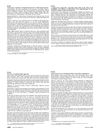
Combining PRP with low-level laser therapy is better for hair growth than PRP alone.
[object Object]  July 2023 in “Journal of Cosmetic Dermatology”
July 2023 in “Journal of Cosmetic Dermatology” Ethosomes could improve how well skin treatments work, but more research is needed on their safety and stability.
 17 citations,
May 2018 in “PeerJ”
17 citations,
May 2018 in “PeerJ” VB-1, a natural compound, may promote hair growth by enhancing a key cell growth pathway.
 May 2024 in “Aesthetic plastic surgery”
May 2024 in “Aesthetic plastic surgery” Combining PRP with minoxidil significantly improves hair growth in AGA patients.
 January 2024 in “Dermatologic Therapy”
January 2024 in “Dermatologic Therapy” PRP therapy with specific growth factors improves hair density and thickness in androgenic alopecia.
January 2022 in “Indian journal of drugs in dermatology” Oral minoxidil helps with hair growth but needs more research to fully understand its effectiveness and safety.
 7 citations,
June 2021 in “Trends in Food Science and Technology”
7 citations,
June 2021 in “Trends in Food Science and Technology” Western diet may cause male pattern baldness; low glycemic diet with magnesium could help.
 66 citations,
June 2015 in “Aesthetic Plastic Surgery”
66 citations,
June 2015 in “Aesthetic Plastic Surgery” Platelet preparations generally show positive effects on wound healing and facial rejuvenation, but more thorough research is needed to confirm their effectiveness.
 195 citations,
February 2007 in “The Journal of Clinical Endocrinology and Metabolism”
195 citations,
February 2007 in “The Journal of Clinical Endocrinology and Metabolism” Dutasteride and finasteride may reduce sperm count and volume but don't affect movement or shape; effects are reversible after stopping.
 15 citations,
March 2013 in “Pharmaceutical nanotechnology”
15 citations,
March 2013 in “Pharmaceutical nanotechnology” Finasteride delivery through skin improved using invasomes and iontophoresis.
 2 citations,
January 2022 in “Journal of the American Academy of Dermatology”
2 citations,
January 2022 in “Journal of the American Academy of Dermatology” Virtual reality can reduce pain during scalp injections.
 1 citations,
July 2007 in “Regenerative Medicine”
1 citations,
July 2007 in “Regenerative Medicine” Stem cell research and regenerative medicine have made significant advancements in treating various diseases and conditions.
 33 citations,
July 2021 in “Clinical, Cosmetic and Investigational Dermatology”
33 citations,
July 2021 in “Clinical, Cosmetic and Investigational Dermatology” Nanocarrier technology in cosmetics improves ingredient delivery and effectiveness while reducing side effects.
 3 citations,
December 2023 in “Cell proliferation”
3 citations,
December 2023 in “Cell proliferation” Stuff from umbilical cord stem cells helps skin heal and look younger.
 2 citations,
November 2022 in “Frontiers in Pharmacology”
2 citations,
November 2022 in “Frontiers in Pharmacology” Local healers in Addis Ababa use 81 medicinal plants, mainly from the Asteraceae family, to treat skin and general diseases, with Echinops kebericho being an endangered plant important in their practices.
 1 citations,
July 2024 in “Skin Research and Technology”
1 citations,
July 2024 in “Skin Research and Technology” Patients with androgenetic alopecia have thinner subcutaneous fat layers in their frontal scalp compared to healthy individuals.
 February 2021 in “International journal of men's social and community health”
February 2021 in “International journal of men's social and community health” Online forums help understand men's concerns about baldness and show the need for better support that changes how baldness is viewed.
 13 citations,
August 2020 in “Journal of Laparoendoscopic & Advanced Surgical Techniques”
13 citations,
August 2020 in “Journal of Laparoendoscopic & Advanced Surgical Techniques” Biotin supplements are generally ineffective in preventing hair loss after sleeve gastrectomy.
[object Object]  January 2008 in “Journal of The American Academy of Dermatology”
January 2008 in “Journal of The American Academy of Dermatology” Trichoscopy is a helpful and quick method to identify different types of hair loss in women.
 68 citations,
May 2018 in “PLOS Biology”
68 citations,
May 2018 in “PLOS Biology” Cyclosporine A may help treat hair loss by blocking a protein that inhibits hair growth.
 4 citations,
March 2016 in “Dermatologic Surgery”
4 citations,
March 2016 in “Dermatologic Surgery” PRP treatment increased hair density, especially in men and younger patients with AGA.
 23 citations,
June 2018 in “Facial Plastic Surgery”
23 citations,
June 2018 in “Facial Plastic Surgery” Platelet-Rich Plasma (PRP) is a low-risk treatment for Androgenic Alopecia (AGA) that generally improves hair count or density, but more research is needed for optimization.
 21 citations,
August 2011 in “Body Image”
21 citations,
August 2011 in “Body Image” Acceptance reduces hair loss distress and medical consultations; coping mechanisms increase them.
 18 citations,
May 2016 in “Aesthetic Surgery Journal”
18 citations,
May 2016 in “Aesthetic Surgery Journal” Body hair transplantation is an effective method for restoring hair in people with severe baldness and limited scalp donor hair.
 99 citations,
June 2005 in “Journal of Cosmetic Dermatology”
99 citations,
June 2005 in “Journal of Cosmetic Dermatology” Hair ages due to genetics and environmental factors, leading to graying and thinning, with treatments available for some conditions.
 26 citations,
June 2020 in “Polymers”
26 citations,
June 2020 in “Polymers” Microneedle made of iron oxide and PVA helps hair regrowth in alopecia treatment.
 39 citations,
March 2019 in “Dermatologic Surgery”
39 citations,
March 2019 in “Dermatologic Surgery” PRP therapy increases hair density for androgenetic alopecia.
 1 citations,
January 2016 in “Springer briefs in molecular science”
1 citations,
January 2016 in “Springer briefs in molecular science” Natural plant-based substances can be used as effective hair dyes.
 August 2024 in “International Journal of Basic & Clinical Pharmacology”
August 2024 in “International Journal of Basic & Clinical Pharmacology” Secretome-based therapies could improve hair growth better than current treatments.
 184 citations,
December 2018 in “Nature Communications”
184 citations,
December 2018 in “Nature Communications” Researchers created human hair follicles using a new method that could help treat hair loss.





























